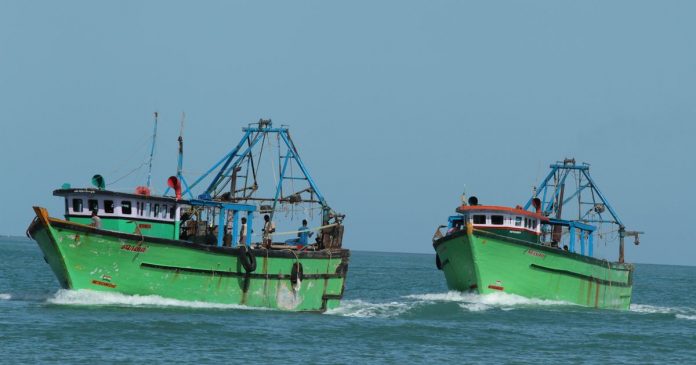As a major step towards curbing the illegal bottom trawling by Indian fishermen in Sri Lankan waters, the Fisheries Ministry has taken steps through diplomatic channels to share the details of intruding Indian trawlers, a senior Fisheries Ministry official said.
The Fisheries Ministry was collecting details such as satellite locations in the Palk Strait from the Sri Lanka Navy, Coastguard and sharing them with the Indian counterparts through diplomatic channels in Colombo.
“We have taken many steps to stop the intrusion of Indian fishermen into our Northern seas, because it affects the livelihood of the Northern fisherfolk, in addition to COVID-19 health concerns,” the official said, while stressing the Indian side were more accommodative in addressing this longstanding dispute.
Yesterday, 97 Indian fishermen from Rameswaram in Tamil Nadu were told by the Tamil Nadu Fisheries authorities that their fishing licences were cancelled along with their fuel quota since their trawlers had engaged in fishing in Lankan territorial waters according to data forwarded by the Sri Lankan authorities.
The Rameshwaram fishermen who were prepared to go to sea staged a protest demanding that they be allowed to go fishing. Their boat number details were shared with Indian authorities. The Indian fishermen claim that whenever they were accused of trespassing into Lankan seas by officials, they used to write a letter apologising for their conduct.
Navy Spokesman Indika de Silva acknowledged that the Navy was sharing the details of Indian trawlers that entered into Sri Lankan waters and engaged in bottom trawling but refused to elaborate on how the Navy collected the data.
Fisheries Minister Douglas Devananda on Wednesday said the government was closely following up the matter with the Indian authorities through diplomatic channels to find a solution to the fishing dispute.
Taking part in a committee stage debate in Parliament, he said the matter was raised at the recent virtual meeting between the Prime Ministers of the two countries and it was decided to explore the possibilities of stopping Indian fishermen from trespassing into Sri Lankan waters.
Northern fishermen alleged that Indian fishermen came as close as three kilometers to the coastal areas to engage in fishing while the Navy turned a blind eye by not arresting them due to COVID-19 risks.



